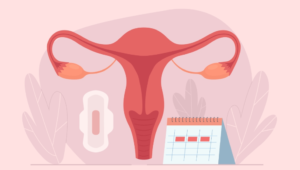The menstrual cycle is a natural process that affects many aspects of a woman’s health, including mood and energy levels. While every woman’s experience is unique, hormonal fluctuations throughout the cycle can lead to significant changes in emotional well-being and physical energy. Understanding how the menstrual cycle affects mood and energy can help women better manage these shifts and maintain balance during each phase. In this blog, we will explore the different stages of the menstrual cycle and how they impact mood and energy, as well as tips for managing these changes.
Understanding the Menstrual Cycle
The menstrual cycle is typically divided into four phases: the follicular phase, ovulation, the luteal phase, and menstruation. Each phase is marked by distinct hormonal changes that influence various aspects of health, including mood and energy levels. These phases generally last about 28 days, though they can vary from person to person. The key hormones in the menstrual cycle are estrogen and progesterone, which fluctuate throughout the month, impacting everything from emotional regulation to physical stamina.
The Follicular Phase (Days 1-14)
The follicular phase begins on the first day of menstruation and lasts until ovulation. During this phase, estrogen levels rise as the body prepares for ovulation. This increase in estrogen has a positive effect on mood and energy levels, leading to feelings of optimism, motivation, and general well-being. Many women report feeling more energetic and focused during this phase, often associated with improved physical performance and mental clarity. Additionally, estrogen helps regulate serotonin, the “feel-good” hormone, which can further boost mood and emotional stability.
Ovulation (Around Day 14)
Ovulation occurs in the middle of the menstrual cycle, typically around day 14 in a 28-day cycle. During this phase, the body releases an egg from the ovary, and estrogen levels peak. As a result, many women experience a surge in energy and mood, feeling more confident, social, and motivated. This is often seen as the “high point” of the menstrual cycle, where physical and emotional well-being are at their best. The increased estrogen levels also promote better skin, hair, and libido, contributing to a positive sense of self and overall vitality.
The Luteal Phase (Days 15-28)
The luteal phase occurs after ovulation and lasts until menstruation begins. During this phase, progesterone levels rise to prepare the body for a potential pregnancy. However, for many women, the increase in progesterone can lead to a variety of emotional and physical symptoms, including mood swings, irritability, fatigue, and bloating. As progesterone causes a decrease in serotonin levels, some women may experience symptoms similar to premenstrual syndrome (PMS), such as anxiety, sadness, or anger. Energy levels tend to dip during this phase, and many women feel more tired or sluggish than usual. This is a natural response to hormonal fluctuations, but managing stress, eating balanced meals, and staying active can help alleviate some of the negative effects of the luteal phase.
Menstruation (Days 1-5)

The menstrual phase marks the beginning of a new cycle. During menstruation, estrogen and progesterone levels are at their lowest, and the body sheds the uterine lining. For many women, this phase is associated with fatigue, discomfort, and lower energy levels. Cramps, bloating, and headaches are common physical symptoms that can drain energy and affect mood. However, the first few days of menstruation can also provide a sense of emotional release, with some women feeling a sense of relief and mental clarity once their period begins. Taking time to rest, hydrate, and engage in light activities can help manage the physical discomfort and energy depletion that often accompany menstruation.
Managing Mood and Energy Throughout the Cycle
While hormonal fluctuations are a natural part of the menstrual cycle, there are several strategies to manage mood and energy changes effectively. Maintaining a balanced diet rich in vitamins, minerals, and healthy fats can support hormonal health and improve energy levels. Regular exercise, such as walking, yoga, or swimming, can also help reduce symptoms like fatigue and anxiety by boosting endorphins. Practising mindfulness and stress-reducing techniques, such as meditation or deep breathing, can improve emotional stability during the luteal phase. Additionally, getting enough sleep and staying hydrated is essential for maintaining energy and mood balance throughout the cycle.
Conclusion
The menstrual cycle has a profound impact on mood and energy levels, with hormonal fluctuations influencing emotional and physical well-being. Understanding the different phases of the cycle and how they affect the body can help women better manage these changes and maintain a sense of balance. By adopting healthy lifestyle practices, including exercise, stress management, and proper nutrition, women can minimize the negative effects of hormonal shifts and optimize their health throughout the month. With this knowledge, women can embrace their menstrual cycle and take proactive steps to enhance their mood and energy levels, leading to improved overall well-being.









